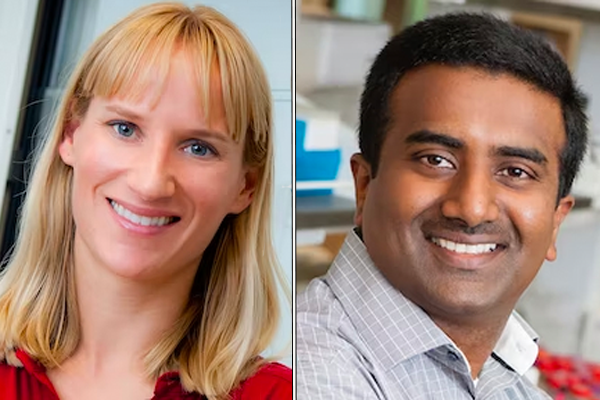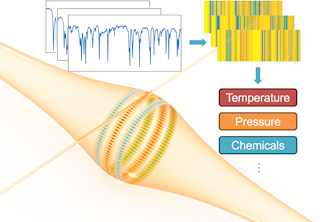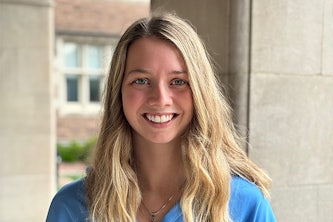Four Washington University faculty named AIMBE Fellows 2023
Hongyu An, Elliot Elson, Srikanth Singamaneni and Jessica Wagenseil are newest fellows

Four Washington University in St. Louis faculty members have been named Fellows of the American Institute for Medical and Biological Engineering (AIMBE), joining 20 existing Fellows at Washington University. They are among 140 engineers who were inducted March 27 in Washington, D.C.
AIMBE’s College of Fellows is limited to the top 2% of medical and biological engineers and are those who are regularly recognized for their contributions in teaching, research and innovation. Membership honors those who have made outstanding contributions to “engineering and medicine research, practice, or education” and to “the pioneering of new and developing fields of technology, making major advancements in traditional fields of medical and biological engineering or developing/implementing innovative approaches to bioengineering education.”
Hongyu An
Hongyu An is a professor of radiology at the School of Medicine. She works on developing new magnetic resonance (MR) imaging and combined positron emission tomography (PET) and MR methods to improve clinical diagnosis and patient management. Her research has led to the first validated MR technique to measure how much oxygen a person’s brain is using at a given moment. Oxygen utilization is a key indicator of brain function and metabolism, and changes in several brain diseases. This imaging technique has helped answer critical questions related to the impact of sickle cell disease on children’s brains, the effects of strokes caused by blood clots, prediction of stroke risk, and the mechanisms of vascular dementia, a common form of dementia resulting from conditions that affect the blood vessels in the brain.
An is also a professor of neurology at the School of Medicine, a professor of biomedical engineering and of electrical & systems engineering at McKelvey School of Engineering, and the director of the Biological MR Center and the associate director of the Center for Clinical Imaging Research at the School of Medicine’s Mallinckrodt Institute of Radiology. She was named a Distinguished Investigator by the Academy for Radiology & Biomedical Imaging Research in 2021 in recognition of her contributions to medical imaging.
Elliot Elson
Elliot L. Elson, an emeritus professor in the Department of Biochemistry and Molecular Biophysics at the School of Medicine, is known for his pioneering role in developing microscopy methods that are now standard tools in the field of biophysics.
Thousands of researchers around the world utilize fluorescence correlation spectroscopy and fluorescence recovery after photobleaching, methods Elson developed to reveal the complex inner workings of cells and their environments. His papers on these methods have had a tremendous impact on the field, with more than 5,000 citations in the scientific literature.
With these techniques, as well as newer methods he has developed, Elson and scientists around the world can study how cells move, change shape and maintain their structure. His contributions to microscopy have revealed important insights into proteins on cell surfaces, key information for understanding cellular structure and function.
Elson is an elected member of the National Academy of Sciences and the American Academy of Arts & Sciences. He is a recipient of the Gregorio Weber Award of the Biophysical Society.
Srikanth Singamaneni
As the Lilyan & E. Lisle Hughes Professor in Mechanical Engineering & Materials Science in the McKelvey School of Engineering, Srikanth Singamaneni’s research includes plasmonic engineering in nanomedicine, including in vitro biosensing for point-of-care diagnostics and in resource-limited settings, molecular bioimaging and nanotherapeutics.
Singamaneni was nominated for innovative developments in plasmonic nanostructures and metal-organic frameworks and for their application to biosensing, bioimaging, nanotherapeutics and biopreservation.
His lab also studies the design and synthesis of novel plasmonic and organic-inorganic hybrid nanostructures for various biomedical applications. A particular focus of his work is plasmon-enhanced fluorescence and Raman scattering for biosensing and bioimaging.
He has received a National Science Foundation CAREER Award and the Dean’s Faculty Award for Innovation in Research. He serves as an associate editor of ACS Applied Materials and Interfaces. He is the author or a co-author of more than 180 refereed articles in journals, 10 invited reviews, six book chapters and one book. He earned a doctorate from the Georgia Institute of Technology.
Jessica Wagenseil
Jessica Wagenseil, professor of mechanical engineering & materials science and the vice dean for faculty advancement in the McKelvey School of Engineering, studies cardiovascular mechanics, specifically focusing on cardiovascular development, extracellular matrix and microstructural modeling. Her work is important for determining clinical interventions for elastin-related diseases and for designing better protocols for building tissue engineered blood vessels.
Wagenseil was nominated for fundamental contributions to our understanding of how large, elastic arteries remodel and adapt during development and disease.
She received the American Society for Matrix Biology Iozzo Award for Mid-Career Investigators in 2020. She has published 70 articles and one book chapter. Her work has been funded by the National Institutes of Health, National Science Foundation, American Heart Association and the Marfan Foundation. She is actively involved in outreach to middle school students from underrepresented groups and is the associate chair of the Equity, Diversity and Inclusion Committee in the McKelvey School of Engineering.
Wagenseil earned a doctorate from Washington University in St. Louis and a bachelor’s degree from the University of California, San Diego.
Tamara Bhandari, Beth Miller and Julia Strait contributed to this story.





